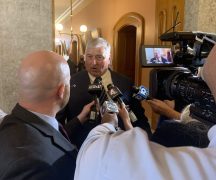Public health took center stage at the Ohio Statehouse on Wednesday, if only for an hour, with experts crediting the government pandemic response for saving lives and asking lawmakers not to hamper the ability to do so again in the future.
Officials representing health departments throughout Ohio are opposed to Republican-backed legislation that would give lawmakers the power to strike down health orders they disagree with.
Sens. Rob McColley, R-Napoleon, and Terry Johnson, R-McDermott, introduced Senate Bill 22 last month with the belief that legislative oversight is a necessary remedy to unchecked executive branch authority. Sen. Theresa Gavarone, R-Bowling Green is a co-sponsor.
Among those publicly opposing the bill are three county health commissioners from McColley’s own district in Northwest Ohio.
Lawmakers on the Senate Government Oversight and Reform Committee heard from several public health experts on Wednesday. This included Dr. Bruce Vanderhoff, the chief medical officer of the Ohio Department of Health, and Dr. Andy Thomas, the chief clinical officer of the Ohio State University Wexner Medical Center who has helped lead the state’s pandemic response.
The two expressed concern about how this legislation could affect Ohio’s ongoing battle against COVID-19 along with any future health crises.
What’s in Senate Bill 22
The Ohio Department of Health (ODH) has authority under current state law to issue health orders meant to prevent the spread of contagious diseases.
SB 22 keeps that authority in place, but would empower lawmakers to rescind any of those orders as they see fit.
The legislature could rescind health orders via concurrent resolution passed by majority votes in both the Ohio House of Representatives and Ohio Senate. Lawmakers could also pass a concurrent resolution to do away with the governor’s executive orders and emergency declarations.

The bill separately creates a “Ohio Health Oversight and Advisory Committee” made up of 10 lawmakers from both chambers and political parties. This committee could similarly vote to strike down health orders, executive orders and emergency declarations.
Research attorneys with the Legislative Service Commission reviewed SB 22 and believe it may be unconstitutional, the Ohio Capital Journal previously reported.
Why health experts are against it
Vanderhoff, Thomas and other health experts take issue with several key components of the legislation as it is currently written.
Under SB 22, if a health order or executive action is struck down, state officials cannot reissue that order (or a “substantially similar order”) for 90 days.
Those testifying said this could tie the hands of the government as new research into a virus is conducted.
“Emergency response must be nimble,” Vanderhoff said, “and public health officials must have the ability to react to rapidly changing conditions as they happen.”
Wednesday’s hearing followed a string of testimony from bill supporters last week, in which maskless citizens blamed the government for the economic, educational and mental health struggles associated with the pandemic. Republican lawmakers have levied similar criticism over the past year; McColley and Johnson have said the DeWine administration has good intentions, albeit an oversized level of authority.
Vanderhoff defended the government’s response, which has included business shutdowns, a mask mandate in public places and in recent months an evening curfew.
“It is COVID-19 that has disrupted our lives and our economy, not the necessary efforts to contain it,” Vanderhoff said.
The ODH chief medical officer acknowledged the need for separation of powers and agreed there should be an active dialogue between the executive and legislative branches of government. He noted there have been certain points when suggestions from lawmakers have helped shape the pandemic response.
McColley has argued that SB 22 does not prevent ODH from issuing any health orders it deems necessary. But Vanderhoff and others believe the bill is misguided in allowing lawmakers to have the final say of which health orders should stay or go.

“We’re looking at this from different angles,” McColley said.
SB 22 hearings thus far dominated by non-health experts
The focus on public health during much of Wednesday’s hearing was a far cry from that of the previous SB 22 hearing, when bill supporters railed against health orders and disputed the effectiveness of masks.
Both Vanderhoff and Thomas took time to explain the science behind mask usage, which have been widely recommended by the medical community since the early months of the pandemic.
Ohio has a mask mandate in public places, but the requirement does not apply to the Statehouse. A number of Republican lawmakers still decline to wear them, including Sen. Kristina Roegner, who chairs the Senate Government Oversight and Reform Committee. McColley, who does wear a mask, took it off while speaking with the people testifying.
While this hearing was supposed to be for opponents of SB 22 and neutral parties, Roegner sped up the health experts’ question and answer segments to make time for two citizens to testify in support of the legislation.
An Akron pastor, who Roegner said was unable to testify last week, spoke out against masks and asserted that ODH based its health orders on misinterpreted data.
A woman who signed up to provide “opponent” testimony said her only opposition to SB 22 was that it did not include an emergency clause to be enacted immediately. She fulminated against health orders and the mask mandate.
All told, SB 22 supporters have so far been given twice as much time to testify than have the health experts speaking out against it.
***
Also from Ohio Capital Journal:
Vaccinations speed up in Ohio as the coronavirus recedes
More than 1.1 million Ohioans have begun the two-shot vaccination process against COVID-19, just 11 months after the state health department first detected the new coronavirus in Ohio.
An analysis of state data shows the seven-day moving average of the number of Ohioans starting the vaccination process has slowly and steadily risen between the first shots Dec. 14 and early February.
About 30,000 state residents per day are starting the process, according to a seven-day moving average.
State health officials expect this figure to rise as they iron out kinks in a complex and temperature sensitive supply chain, the two vaccines on the market ramp up production, and the Johnson & Johnson vaccine presumably enters the market in the coming weeks. READ MORE
The family court judge who threatened a mother with contempt for getting her child a COVID-19 test
Ohio juvenile court Judge Timothy Grendell has been outspoken about his belief that the COVID-19 pandemic is overblown.
At a protest rally in May, just steps away from where he presides over family court, Grendell proclaimed that public health restrictions to contain the pandemic were unconstitutional and “we should be allowed to get back to our lives.” The following month, he testified to state lawmakers in Columbus that health authorities and a “drumbeat” of media coverage had “created an atmosphere of fear” surrounding the virus.
But Grendell hasn’t confined his views to the public square. A few weeks after he testified to lawmakers, he referred to the pandemic as a “panic-ademic” in the midst of a custody proceeding in his courtroom in Geauga County, outside Cleveland. And he has claimed that 15 mothers in his court have used the virus as an excuse in custody cases to “mess with” their exes’ parenting time.
Then, on Oct. 2, Grendell made an order that legal experts call unheard of, and medical experts say could cause harm. The judge banned two parents, who were wrangling over custody of their young boys, from having the “children undergo COVID-19 testing” without his approval, according to the court record. READ MORE
HELP OHIO CAPITAL JOURNAL GROW Make a tax-deductible donation.





